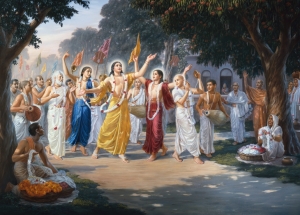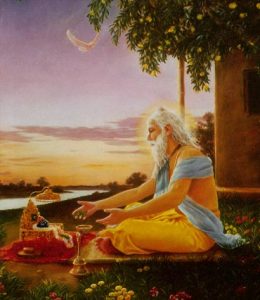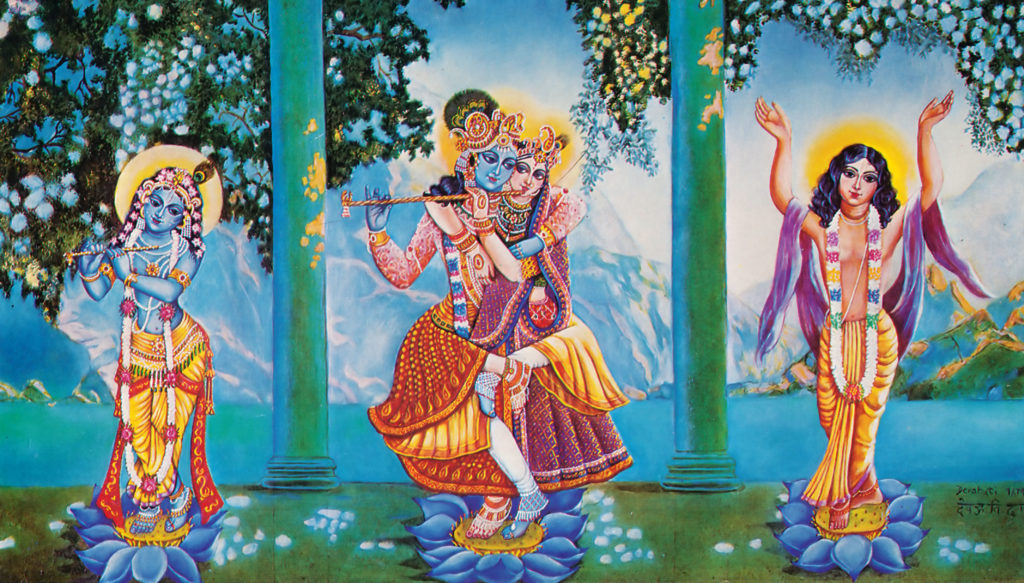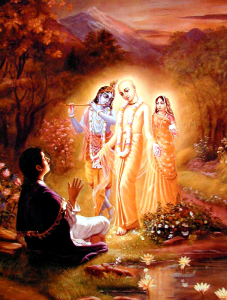Sunday, 22 March 2020
Guru
Monday, 9 March 2020
What were the three confidential reasons for appearance of Sri Chaitanya Mahaprabhu ?
CC Ādi 4.230: Desiring to understand the glory of Rādhārāṇī’s love, the wonderful qualities in Him that She alone relishes through Her love, and the happiness She feels when She realizes the sweetness of His love, the Supreme Lord Hari, richly endowed with Her emotions, appeared from the womb of Śrīmatī Śacī-devī, as the moon appeared from the ocean.”
The first purpose was to relish the position of Śrīmatī Rādhārāṇī, who is the prime reciprocator of transcendental love of Śrī Kṛṣṇa. Lord Kṛṣṇa is the reservoir of transcendental loving transactions with Śrīmatī Rādhārāṇī. The subject of those loving transactions is the Lord Himself, and Rādhārāṇī is the object. Thus the subject, the Lord, wanted to relish the loving mellow in the position of the object, Rādhārāṇī.
The second reason for His appearance was to understand the transcendental mellow of Himself. Lord Kṛṣṇa is all sweetness. Rādhārāṇī’s attraction for Kṛṣṇa is sublime, and to experience that attraction and understand the transcendental sweetness of Himself, He accepted the mentality of Rādhārāṇī.
The third reason that Lord Caitanya appeared was to enjoy the bliss tasted by Rādhārāṇī. The Lord thought that undoubtedly Rādhārāṇī enjoyed His company and He enjoyed the company of Rādhārāṇī, but the exchange of transcendental mellow between the spiritual couple was more pleasing to Śrīmatī Rādhārāṇī than to Śrī Kṛṣṇa. Rādhārāṇī felt more transcendental pleasure in the company of Kṛṣṇa than He could understand without taking Her position, but for Śrī Kṛṣṇa to enjoy in the position of Śrīmatī Rādhārāṇī was impossible because that position was completely foreign to Him. Kṛṣṇa is the transcendental male, and Rādhārāṇī is the transcendental female. Therefore, to know the transcendental pleasure of loving Kṛṣṇa, Lord Kṛṣṇa Himself appeared as Lord Caitanya, accepting the emotions and bodily luster of Śrīmatī Rādhārāṇī.
Lord Caitanya appeared in order to fulfill these confidential desires, and also to preach the special significance of chanting Hare Kṛṣṇa, Hare Kṛṣṇa, Kṛṣṇa Kṛṣṇa, Hare Hare/ Hare Rāma, Hare Rāma, Rāma Rāma, Hare Hare and to answer the call of Advaita Prabhu. These were secondary reasons.
CC Ādi 4.238 — Once Lord Kṛṣṇa considered within His heart, “Everyone says that I am complete bliss, full of all rasas.
CC Ādi 4.239 — “All the world derives pleasure from Me. Is there anyone who can give Me pleasure?
CC Ādi 4.240 — “One who has a hundred times more qualities than Me could give pleasure to My mind.
CC Ādi 4.241 — “One more qualified than Me is impossible to find in the world. But in Rādhā alone I feel the presence of one who can give Me pleasure.
CC Ādi 4.242-243 — “Although My beauty defeats the beauty of ten million Cupids, although it is unequaled and unsurpassed, and although it gives pleasure to the three worlds, seeing Rādhārāṇī gives pleasure to My eyes.
CC Ādi 4.244 — “The vibration of My transcendental flute attracts the three worlds, but My ears are enchanted by the sweet words of Śrīmatī Rādhārāṇī.
CC Ādi 4.248 — “Thus although I am the source of happiness for the entire world, the beauty and attributes of Śrī Rādhikā are My life and soul.
CC Ādi 4.249 — “In this way My affectionate feelings for Śrīmatī Rādhārāṇī may be understood, but on analysis I find them contradictory.
CC Ādi 4.250 — “My eyes are fully satisfied when I look upon Śrīmatī Rādhārāṇī, but by looking upon Me, She becomes even more advanced in satisfaction.
CC Ādi 4.262 — “I am always eager to taste the joy that Rādhārāṇī derives from Me.
CC Ādi 4.263 — “In spite of various efforts, I have not been able to taste it. But My desire to relish that pleasure increases as I smell its sweetness.
CC Ādi 4.264 — “Formerly I appeared in the world to taste mellows, and I tasted the mellows of pure love in various ways.
CC Ādi 4.265 — “I taught devotional service that springs from the devotees’ spontaneous love by demonstrating it with My pastimes.
CC Ādi 4.266 — “But these three desires of Mine were not satisfied, for one cannot enjoy them in a contrary position.
CC Ādi 4.267 — “Unless I accept the luster of the ecstatic love of Śrī Rādhikā, these three desires cannot be fulfilled.
CC Ādi 4.268 — “Therefore, assuming Rādhārāṇī’s sentiments and bodily complexion, I shall descend to fulfill these three desires.”
CC Ādi 4.269 — In this way Lord Kṛṣṇa came to a decision. Simultaneously, the time came for the incarnation of the age.
CC Ādi 4.231 — All these conclusions are unfit to disclose in public. But if they are not disclosed, no one will understand them.
CC Ādi 4.232 — Therefore I shall mention them, revealing only their essence, so that loving devotees will understand them but fools will not.
All glories to Sri Guru and Gauranga.
All glories to Srila Prabhupada.
Why Krishna comes as Caitanya Mahaprabhu?
Hare Krishna and pranams dear devotees,
Among all the incarnations of Absolute Truth, Krishna’s pastimes, in particular, are puzzling even for the demigods (lord Brahma’s and Indra’s pastimes come immediately to the mind) what to speak of humans and the demons. Therefore when Krishna comes as Caitanya Mahaprabhu then it is even more puzzling. Why Krishna comes as Caitanya Mahaprabhu? What inspires Krishna to become His own devotee? Krishnadasa Kaviraj Gosvami demystifies this secret in Caitanya Caritamrita and discloses three external and three internal reasons for it.
Before we acsess these secrets, let us first pray to the lotus feet of Sri Caitanya Mahaprabhu and His associates.
jaya jaya śrī-caitanya jaya nityānanda
jayādvaita-candra jaya gaura-bhakta-vṛnda
Three external reasons for the appearance of Sri Caitanya Mahaprabhu
1. To bestow Vraja bhakti upon us.
Lord Kṛṣṇa enjoys His transcendental pastimes as long as He wishes, and then He disappears. After disappearing, however, He thinks thus: “For a long time I have not bestowed unalloyed loving service to Me upon the inhabitants of the world. Without such loving attachment, the existence of the material world is useless.
“Everywhere in the world people worship Me according to scriptural injunctions. But simply by following such regulative principles one cannot attain the loving sentiments of the devotees in Vrajabhūmi. “Knowing My opulences, the whole world looks upon Me with awe and veneration. But devotion made feeble by such reverence does not attract Me. “By performing such regulated devotional service in awe and veneration, one may go to Vaikuṇṭha and attain the four kinds of liberation.
“My plenary portions can establish the principles of religion for each age. No one but Me, however, can bestow the kind of loving service performed by the residents of Vraja. “Therefore in the company of My devotees I shall appear on earth and perform various colorful pastimes.” Thinking thus, the Personality of Godhead, Śrī Kṛṣṇa Himself, descended at Nadia early in the Age of Kali.
(CC Adi 3.13-17, 3. 13.26,28,29)
2. To inaugurate the Yuga Dharma for Kali yuga- Sankirtana yajna

In Śrīmad-Bhāgavatam it is repeatedly and clearly said that the essence of religion in the Age of Kali is the chanting of the holy name of Kṛṣṇa. “In the Age of Kali, intelligent persons perform congregational chanting to worship the incarnation of Godhead who constantly sings the name of Kṛṣṇa. Although His complexion is not blackish, He is Kṛṣṇa Himself. He is accompanied by His associates, servants, weapons and confidential companions.”
My dear brothers, please hear all these glories of Lord Caitanya. This verse clearly summarizes His activities and characteristics The two syllables “kṛṣ-ṇa” are always in His mouth; or, He constantly describes Kṛṣṇa with great pleasure. These are two meanings of the word “kṛṣṇa-varṇa.” Indeed, nothing else but Kṛṣṇa issues from His mouth.
“By performing the sacrifice of congregational chanting of the holy name, learned scholars in the Age of Kali worship Lord Kṛṣṇa, who is now nonblackish because of the great upsurge of the feelings of Śrīmatī Rādhārāṇī. He is the only worshipable Deity for the paramahaṁsas, who have attained the highest stage of the fourth order [sannyāsa]. May that Supreme Personality of Godhead, Lord Caitanya, show us His great causeless mercy.”
3. Loud cries by Sri Advaita Acarya

Advaita Ācārya having appeared, He found the world devoid of devotional service to Śrī Kṛṣṇa because people were engrossed in material affairs. Everyone was engaged in material enjoyment, whether sinfully or virtuously. No one was interested in the transcendental service of the Lord, which can give total relief from the repetition of birth and death. Seeing the activities of the world, the Ācārya felt compassion and began to ponder how He could act for the people’s benefit.
Thinking of the lotus feet of Śrī Kṛṣṇa, He constantly offered tulasī buds in water from the Ganges. He appealed to Śrī Kṛṣṇa with loud calls and thus made it possible for Kṛṣṇa to appear. Therefore the principal reason for Śrī Caitanya’s descent is this appeal by Advaita Ācārya. The Lord, the protector of religion, appears by the desire of His devotee.
Three confidential reasons for the appearance of Sri Chaitanya Mahaprabhu
Desiring to understand the glory of Rādhārāṇī’s love, the wonderful qualities in Him that She alone relishes through Her love, and the happiness She feels when She realizes the sweetness of His love, the Supreme Lord Hari, richly endowed with Her emotions, appeared from the womb of Śrīmatī Śacī-devī, as the moon appeared from the ocean.”
Once Lord Krishna considered within His heart, “Everyone says that I am complete bliss, full of all rasas. “All the world derives pleasure from Me. Is there anyone who can give Me pleasure? “One who has a hundred times more qualities than Me could give pleasure to My mind. “One more qualified than Me is impossible to find in the world. But in Rādhā alone I feel the presence of one who can give Me pleasure.
“Although My beauty defeats the beauty of ten million Cupids, although it is unequaled and unsurpassed, and although it gives pleasure to the three worlds, seeing Rādhārāṇī gives pleasure to My eyes.
“The vibration of My transcendental flute attracts the three worlds, but My ears are enchanted by the sweet words of Śrīmatī Rādhārāṇī. “Thus although I am the source of happiness for the entire world, the beauty and attributes of Śrī Rādhikā are My life and soul. “In this way My affectionate feelings for Śrīmatī Rādhārāṇī may be understood, but on analysis I find them contradictory.
“My eyes are fully satisfied when I look upon Śrīmatī Rādhārāṇī, but by looking upon Me, She becomes even more advanced in satisfaction. “I am always eager to taste the joy that Rādhārāṇī derives from Me. “In spite of various efforts, I have not been able to taste it. But My desire to relish that pleasure increases as I smell its sweetness.
“Formerly I appeared in the world to taste mellows, and I tasted the mellows of pure love in various ways. “I taught devotional service that springs from the devotees’ spontaneous love by demonstrating it with My pastimes. “But these three desires of Mine were not satisfied, for one cannot enjoy them in a contrary position.
“Unless I accept the luster of the ecstatic love of Śrī Rādhikā, these three desires cannot be fulfilled. “Therefore, assuming Rādhārāṇī’s sentiments and bodily complexion, I shall descend to fulfill these three desires.” In this way Lord Kṛṣṇa came to a decision. Simultaneously, the time came for the incarnation of the age.
(CC Adi 4. 238-244, 248-50, 62-69)

All glories to Sri Guru and Gauranga.
All glories to Srila Prabhupada.




